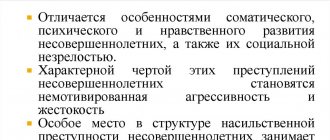Moscow
Saint Petersburg
Free consultation
In accordance with Russian criminal legislation, the fact that a criminal act was not completed does not exclude criminal liability for its commission.
Chapter 6 of the Criminal Code of the Russian Federation establishes liability for unfinished crimes at various stages (preparation, attempt, completed crime).
Using the example of one of the most common elements of crime, let us consider in more detail the stage of an attempted criminal act.
Responsibility for a crime
The criminal law provides for a fairly extensive list of punishments for crimes of varying severity. In the case of an attempted theft, everything is the same - the coercive measures will be different. Depending on the qualifying features, the severity of the punishment increases.
To understand what possible sanctions will be applied to a person, you must first understand what circumstances influence the crime. Circumstances aggravating the guilt of the subject include:
- committing a crime as part of a group of persons organized by or by prior conspiracy;
- penetration into a home and other private premises;
- the amount of damage is not less than 5 thousand rubles;
- theft from bags, pockets and other types of hand luggage;
- large amount of damage (at least 250 thousand rubles);
- theft from gas and oil pipelines;
- especially large damage from criminal acts (from one million rubles).
The presence of at least one of these signs significantly increases the punishment. If the crime is committed without their presence, and there is also an attempted petty theft, then most likely the subject will avoid being held accountable. Especially if he committed such an action for the first time.
Responsibility and punishment for attempted theft will be determined by the court, based on the case materials and the identity of the accused. Often, the circumstances that prevented the offender from completing the crime are also taken into account. For example, if the car alarm went off and the thief was unable to remove the radio in a timely manner, this poses a greater danger than such a circumstance as the offender’s ignorance of the radio’s structure, as a result of which he was unable to complete the theft.
It should be noted that attempted theft, like the theft itself, can be completed or not completed. An attempted theft is considered completed if the culprit does everything possible to achieve his goal, but fails to achieve the desired result. An example is a situation in which a buyer in a self-service store, having hidden a chocolate bar in his coat sleeve, tried to pass it through the payment center (checking whether the signal would beep or whether he would be able to carry the goods). This is a completed attempt at theft, but not yet theft.
An unfinished attempt at theft will occur when the criminal, against his own will, cannot carry out everything that he considers necessary to achieve his illegal goal. For example, a man entered a car in order to steal a fur hat lying on the front seat, but the driver of the car passing nearby noticed the criminal and did not allow him to pull out the hat.
For violating the law in the form of attempted theft, a person may be subject to the same penalties as for a completed crime. The violator may receive as a sanction:
- fine;
- compulsory work;
- correctional work;
- forced labor;
- deprivation of liberty;
- restriction of freedom.
It is very important to note that attempted theft is an unfinished form of violation; accordingly, the judge cannot impose a sanction in the same amount as for theft. The presiding officer has no right to assign to the violator more than ¾ of the maximum penalty for the violated article
Imprisonment is imposed only for theft on an especially large scale; for attempted theft, this sanction is assigned quite rarely. It is applied only in cases where all aggravating features are present and there is a relapse of the crime.
According to established legal norms, no one has the right to be held accountable without evidence. Until guilt is proven in court, the principle of innocence applies. That is why, if you are accused of attempted crime, demand evidence. It is also important to immediately contact a lawyer who will provide you with advice and ensure that your rights are fully respected.
Many people are mistaken in thinking that attempted theft is not a serious violation of the law. This is not so, theft in itself is considered a rather serious crime, because, as mentioned above, it implies punishment even in the form of imprisonment. At first glance, an insignificant attempt to take something you like out of the store can cause serious legal consequences, in particular, a criminal record, but it remains in the biography forever.
Theft on a small scale
Most often, law enforcement officers are faced with the theft of items of small value or small amounts of money.
Such an offense is not subject to punishment under the Criminal Code. Responsibility for it applies according to paragraph 7.2 of the Code of Administrative Offences. In this article, the amount of stolen goods is limited to two and a half thousand rubles (maximum). Moreover, penalties are divided depending on the specific cost of damage as follows:
- up to one thousand rubles;
- from 1,000.0 to 2,500.0 rub.
Such an offense is punished in various ways. They are shown in the table:
| Amount of damage | Fine | Arrest (days) | Mandatory work (hours) |
| Up to 1,000.0 | Fivefold, but not less than 1,000.0 | Up to 15 | Up to 50 |
| Up to 2,500.0 | Also, but not less than 3,000.0 | From 10 to 15 | Up to 120 |
When investigating petty theft, all the circumstances of the case are examined. The following are considered aggravating:
- conspiracy of persons;
- damage to property;
- entering a room or home;
- commission of an offense by a previously convicted person.
Important: petty theft can be punished under the Code of Administrative Offenses, and other offenses can be classified under the paragraphs of the Criminal Code.
Example 6 . N., being in the same company with M., heard the latter’s boasting about a successful deal. M. told his friends that he had become the owner of a large sum of money. N. decided to steal the funds. He followed M. and found out his residential address. After waiting until the morning, when the owner of the house left for work, he climbed into the apartment. After searching the premises, I found neither money nor valuables. I grabbed a watch from the apartment that looked expensive.
The value of the stolen property turned out to be insignificant, only 500.0 rubles. However, M. was found guilty of breaking into a residential premises. He was tried under paragraph 158 of the Criminal Code (Part 1).
Incomplete shoplifting
This is the most common case of petty theft.
Attackers do not always try to take over a company's property for selfish reasons. Often such actions are carried out out of mischief. However, the reason in this case does not relieve guilt. When an intruder is caught, security must call the police to investigate the theft. However, this does not always happen. As a rule, the first step is to estimate the value of the stolen property. If it does not reach 2.5 thousand rubles, then the security acts according to the instructions of the supermarket owner. Such an offense is punishable by penalties under the Code of Administrative Offences, which is known to the employees of the institution. They act according to the situation:
- make up a description of the attacker;
- decide to involve the police.
At the same time, security officers take into account the main features of the application of punishments described above. Law enforcement officers are involved if serious damage could be caused to the enterprise. That is, the value of the stolen property is high. In other cases, the goods are taken away and the attacker is released. At this moment, the thief’s voluntary repentance will influence the security’s decision.
The police are usually involved in the investigation in the following situations:
- participation in the theft of a group of persons was revealed;
- the caught thief has obvious antisocial tendencies;
- a man was caught who had previously been caught stealing.
Attention: not calling the police when detecting theft in a store of any size is a reckless act. Security guards may be harmed if information reaches law enforcement.
About forgetfulness of buyers and malicious intent
Nowadays, a common situation is when a person takes an item in a supermarket and forgets about it when he goes to the checkout.
Psychologically, this behavior is understandable, because there are a lot of goods in the hall that distract attention. It’s easy to forget where shopping began. Theft is detected after the client has paid for the purchase. The security is not inclined to believe the attacker's explanations. And it is extremely difficult to prove the absence of selfish intent in this situation. If the police are involved, then such forgetfulness ends in a lawsuit. The price of unpaid goods affects only the size of the penalty and its qualification. Sometimes forgetfulness can lead to criminal prosecution. Shoppers should be more careful in supermarkets.
Important: only the court can punish petty and any other theft. It is illegal for supermarket employees to demand payment of a fine.
Recommendations
Theft can occur in a store, at an enterprise, on public transport, in a bank and in other places. How to deal with theft? Experts recommend developing a specific action plan aimed at stopping unlawful actions. Of course, its preparation should be carried out taking into account the characteristics of the team, enterprise, and other circumstances. For example, the security system in a factory and in a sales area will be significantly different. However, some general guidelines can be identified:
- Development of local regulatory documents. The established rules must be written down in special documents. Each subject should familiarize themselves with them. At the enterprise, much attention should be paid to work regulations and the content of job descriptions. The system of individual and collective financial responsibility is of no small importance. The development of local regulations is mainly about preventing theft.
- Formation of a control and accounting system. The head of the company should always have access to information about the product at each level of its movement. This will not only allow you to monitor the production process, but will also provide the opportunity to conduct a sudden inspection of it. Employees, in turn, if such a system is in place, will understand that any illegal action will definitely be detected.
- Checking a new employee. When applying for a job, a candidate provides a certain package of documents. They must be checked for authenticity. In addition, it is advisable to inquire about the previous place of work and request a reference for the employee from there. It is imperative to identify a person’s bad habits. In particular, the craving for gambling, drinking, etc. is of particular importance.
- Careful selection of employees for the management staff. It must be remembered that in any enterprise the administration acts as a standard, a model. She sets the tone for the work. Managers contribute to the creation of the image of the general director and shape the attitude of employees towards the head of the company. That is why the administrative apparatus must contain verified, and most importantly, honest people.
- Identification and harsh criticism of theft. Cases of detection of violations and identification of those responsible must be made public within the enterprise team. The manager should develop a scheme according to which he will have the opportunity to get rid of careless employees as soon as possible. In such cases, exceptions and concessions cannot be made under any circumstances. If local regulations establish strict rules and provide for specific measures aimed at combating theft, they must be strictly followed.
It should also be noted that it is extremely important to adhere to ethical standards when interacting with staff. In the process of counteracting and bringing to justice employees caught stealing, the rights of honest, conscientious employees must not be offended or in any way infringed.
Punishment should only be reserved for guilty persons.
Release from liability
A person can be released from liability provided that the amount (cost of the stolen property) is less than 1,000 rubles.
In addition, criminal law guarantees exemption from liability if a citizen independently refuses to continue the implementation of his criminal intent aimed at stealing valuables.
For example, a man took a bottle of cognac from the counter and decided to take it out of the store in his jacket sleeve, without paying anything. After a few minutes, he decided to return the alcohol and put the bottle back in its place.
In this case, they cannot be held liable. If the man had taken out the bottle, then liability would have arisen under an administrative violation - Article 7.27 of the Code of Administrative Offenses (petty theft).
This is a standard classification of shoplifting, when an item is taken from the shelves, or when something not very valuable is taken from the street. But there is no fact, there is no punishment.
In addition, administrative legislation does not provide for such concepts as attempt or preparation for theft, so in most cases there is no liability.
Punishment for attempted petty theft under the Code of Administrative Offenses of the Russian Federation
Russian criminal legislation does not provide for criminal liability for attempted petty theft or attempted petty theft upon its initial commission.
The administrative legislation of Russia does not provide for liability for attempted, or rather attempted, petty theft. In other words, administrative liability is possible only for completed trains .
And in general, this area of law does not contain the concept of theft. It is borrowed by analogy from criminal law. This is a kind of gap in the legislation and creates certain problems in law enforcement.
Petty theft, punishable by the administrative code of Russia, means theft committed by theft, fraud, misappropriation or embezzlement, if the value of the stolen property does not exceed 1000 and 2500 rubles, respectively, for the first and second parts of Article 7.27 of the Code of Administrative Offenses of the Russian Federation.
And also in the actions of a person there are no qualifying features of the relevant articles of the Criminal Code of the Russian Federation (158, 159, 159.1, 159.2, 159.3, 159.5, 159.6, 160).
The amount of property damage caused to the victim should not exceed the amount of 2,500 rubles, otherwise petty theft turns into the most common - criminal, with all the ensuing consequences.
So, in order to bring a person to administrative responsibility for petty theft, the following signs must be present:
- property damage caused by an act not exceeding 1000 and 2500 rubles, respectively, according to parts 1 and 2 of the Code of Administrative Offences;
- absence of qualifying features of the relevant articles of the Criminal Code.
- the offense must be complete.
An example of petty theft. Citizen E. in the Auchan hypermarket hides a bottle of whiskey under items of clothing, enters the technological room of the store and drinks the contents of the bottle, after which he goes out. On his way out, E. is stopped by a security guard and discovers an empty bottle. Recordings from CCTV cameras confirm E’s actions. Based on the assessment of the goods, the cost of a bottle of whiskey was determined to be 2,350 rubles. During a preliminary check with the police, it was established that E. had not previously been brought to administrative responsibility for theft.
The qualifying features of Article 158 of the Criminal Code have not been established in E.’s actions. There is evidence of E. committing petty theft, punishable under Part 2 of Article 7.27 of the Code of Administrative Offenses of the Russian Federation.
If citizen E. in this situation stole, for example, a shirt of similar value and was detained by a security guard, then no corpus delicti or crime would be found in his actions. Since E.’s actions would not be considered completed, there is no sign of the possibility of disposing of property at his own discretion.
The absence of the concept of stages of commission in administrative legislation not only creates the preconditions for the possibility of endless unpunished attempts at theft in stores, but also various problems and diversity in the enforcement of these articles.
You should not expect to go unpunished in these situations.
For example, in some regions, administrative liability for attempted thefts in the same stores is applied and the persons committing these attempts are held accountable (courts interpret the end point of the act differently).
In cases of attempted theft of food and alcohol, some courts recognize the fact of disposal of property as having taken place - they could drink or eat.
Persons who damage products while attempting to take possession of someone else's property are subject to civil damages through the courts.
And in general, all the staff, as a rule, know the people who constantly commit petty thefts in stores and they try not to let them in, they are closely watched and sooner or later they are brought to justice either administratively or criminally.
Moscow
Saint Petersburg
Free consultation
Moscow
Saint Petersburg
Material damage
It acts as one of the signs of the objective part of the crime. Material damage is associated with the forcible seizure of material assets. For petty theft committed by fraud, theft, embezzlement, misappropriation, administrative liability is provided (Article 7.27 of the Administrative Code). Material harm caused to the owner of a thing must have a causal connection with the actions of the subject who committed the unlawful act
When deciding whether there is or is no corpus delicti, the opinion of the owner of the stolen item is not taken into account as to whether there is property damage and whether the perpetrator needs to be held accountable. The value of illegally seized property is determined on the day the crime was committed
The amount of material damage is established on the date of the decision on collection with subsequent indexation.
Qualification of the crime
To determine the corpus delicti and prescribe penalties, law enforcement officers determine under what circumstances the crime was committed. In particular, whether the actions of the criminals are theft or robbery or robbery. If it is determined that no threats or violence were used against the owners of the stolen property during the theft, the investigation begins to clarify other circumstances:
- Was the crime committed by prior conspiracy or spontaneously? If it is possible to prove a preliminary conspiracy, the crime is classified under Part 2 of Article 158 of the Criminal Code.
- Whether the criminals were a non-permanent random group or an organized group of trained robbers.
- Have the group members been previously observed in this type of activity, have they committed thefts before in this group, and is the crime a repeat crime?
Also during the trial, attention will be paid to the presence of mitigating circumstances, whether the criminals can compensate for the damage to the victim and whether the latter agrees to a mitigation of the punishment. But, regardless of whether the criminals managed to sell the stolen goods or can return the property to the victim, the crime will be considered completed from the moment the theft is carried out
An unsuccessful theft attempt is classified under a different article - we will talk about this in a separate article.
Something is not clear? and get expert commentary
Arbitrage practice
Court decisions when considering cases of unfinished thefts are made taking into account many factors. The main ones are:
- the amount of potential damage to the victim;
- the reason for the incompleteness of the crime;
- the presence of preparatory measures for committing a crime;
- purpose of attempted theft, possession, transfer to third parties, permanent use or temporary use.
Let's consider certain types of thefts and the main decisions that are made on such crimes.
Attempted car theft
Since the theft of a car is mainly associated with major damage (the cost of cars is more than 250,000 rubles), the preventive measure is mainly chosen according to paragraph 3 of Article 158 of the Criminal Code of Russia. If the cost of the car exceeds 1,000,000 rubles, then paragraph 4 of Article 158 of the Criminal Code of Russia comes into force.
If the attempt is made without the purpose of theft, then liability is provided for under Article 166 of the Criminal Code of Russia. Such cases may result in actual imprisonment.
Attempted shoplifting
If attempted shoplifting is committed by a minor, most cases are handled on the spot by store security guards. In this case, police officers are involved and a warning is issued. Cases of attempted theft that fall under Article 7.21 of the Code of Administrative Offenses of Russia are resolved in the same way.
If the attempted theft is committed by adults, then the cases are considered on a general basis. The only condition is mandatory merchandising examination, which will determine the potential value of the goods. It is the decision of the experts that determines under which paragraph of Article 158 of the Criminal Code of Russia the case will be considered. Depending on this, a preventive measure will be chosen. Basically, the cost of goods does not exceed the amount of 250,000 rubles, and therefore in such cases there is no real imprisonment.
Attempted cell phone theft
Basically, the cost of mobile phones varies from 5,000 to 15,000 rubles, and, accordingly, they are considered under paragraph 2 of article 158 of the Russian Criminal Code.
The cost of potential damage is calculated by judicial or independent experts. For the most part, such cases do not threaten actual imprisonment.
Article 158 commentary
The object of encroachment is material assets. The object of the unlawful act is relations in the sphere of property. Theft is a crime with material elements. The subject of the encroachment may be:
- Money.
- Things that are created by human labor and have spiritual or material value.
- Documents acting as the equivalent of money.
- Securities.
The subject of theft may be documents of an intangible nature that have no value, but provide an opportunity to obtain property. Such documents, for example, include invoices and luggage receipts. Their theft for the purpose of subsequent use for the conversion of property in favor of the perpetrator or third parties is qualified as preparation for fraud.
Decoding concepts
Attempted theft is regarded under Article 158 of the Criminal Code of Russia only if the following signs of a crime are present:
- selfish purpose, i.e. the crime must have the intent to obtain benefits from the theft of property;
- gratuitous in nature, i.e. for the secretly seized property its cost will not be paid, no other property of equal value will be provided for it, or the cost will not be fully covered;
- the presence of material damage, i.e., if a crime were committed, the owner of the property would suffer damage. The amount of damage affects the measure of restraint. It is calculated from the value of the property at the time of the theft attempt or based on the conclusion of an expert commission.
The concept of theft, and, accordingly, attempted theft, includes only those acts that are aimed at secretly confiscating property that does not belong to the criminal, as well as property to which he does not have an alleged right.
The presumptive right to own property refers to the debt the victim owes to the offender. Accordingly, secret theft or its attempt is carried out to cover the debt. In this case, the crime will be regarded as arbitrariness and will fall under Article 330 of the Criminal Code of Russia.
You should know:
- the seizure of property is usually understood as the actual transfer of property from the owner to the criminal or other persons in whose favor the crime is committed;
- preparation of theft is considered to be thinking about the details of committing a crime, drawing up plans, searching, preparing related tools and other signs of an offense that provide conditions for the possibility of committing a crime;
- attempted theft is considered to be intentional actions aimed at committing an illegal act that is not completed for any reason dependent or independent of the offender.
If the offender can (has the potential) to complete the crime, but does not complete it, then the court may qualify this as a refusal to commit the crime.
In this case, the following factors are taken into account when making a decision:
- voluntary refusal to commit a crime;
- no attempts to commit this illegal act a second time;
- refusal of a crime due to its illegality, i.e. a crime is not committed due to the fact that criminal liability is provided for it. This rule is regulated by Article 31 of the Criminal Code of Russia.
Examples of attempted theft
Let's look at a few typical examples of attempted theft of someone else's property.
Attempted shoplifting
We can safely say that theft in large chain stores is the most common in our time. Despite modern methods of protection in supermarkets, the organization of serious security of trading floors, the presence of video surveillance, thefts are committed there every day by tens and hundreds.
A considerable number of them are also stopped in these places precisely at the stage of the assassination attempt.
Example. Citizen Ya came to the Lenta hypermarket, hid a couple of sticks of sausage under his clothes, put a bottle of cognac in his jacket pocket, and put sweets and chocolate in his jacket pockets. When approaching the cash registers, Ya. was stopped by the store security guard and taken to the back room, where police officers were called to document the situation.
Having recalculated the cost of the goods that Ya tried to steal, the amount was established at 3 thousand rubles. Ya. honestly admitted to the police that he had the intention of taking goods from the store without paying, but was noticed and stopped by a security guard.
Y. was unable to use the stolen property and dispose of it at his own discretion due to circumstances beyond his control (he was detained by security). Subsequently, Ya. will be charged under Part 1 of Article 158, Part 3 of Article 30 of the Criminal Code of the Russian Federation for attempted theft of someone else’s property.
Attempted theft of funds
Example. Citizens O. and S. agreed in advance to steal money from ATMs located in accessible places in the city at night, purchased the necessary equipment and a car. O. and S. entered one of the bank premises, where there were several ATMs. The method used to open ATMs was determined by the comrades to explode the terminal body and further confiscate the cassettes with money.
O. pumped gas into two ATMs and lit the fuse, a strong explosion occurred, from which O. was concussed and lost consciousness, S. left the bank premises and drove away. O. was detained at the scene of the crime by the arriving officers of the Russian Guard. The next day S. was also detained.
In the actions of O. and S., the investigative authorities can reasonably determine the corpus delicti under Art. 158 part 2, part 3 of article 30 of the Criminal Code of the Russian Federation – attempted theft of someone else’s property. In this case, the criminals could not even take possession of the money, but nevertheless they will bear criminal liability.
We can summarize briefly.
- If someone tried to commit theft and was unable to bring his actions to the desired conclusion not of his own free will, we will have - attempted theft.
- Despite the unfinished nature of the criminal act, the person who committed the attempt will be held criminally liable.
- An exception to these rules will be a voluntary refusal to commit a crime.
How to distinguish theft from misappropriated finds
Found property is considered to be a thing that has ceased to belong to the owner or legal owner.
It is very important that at the time of appropriation by the perpetrators it can be identified as an unattended item. . If you find an item in a vehicle or in a room, you must hand it over: in the first case, to the conductor and driver, in the second, to the manager and representative of the room (for example, in a library, to a librarian)
If you find an item in a vehicle or in a room, you must hand it over: in the first case, to the conductor and driver, in the second, to the manager and representative of the room (for example, in a library, to a librarian).
Then this person is considered the finder, and he is obliged to call the police or other authorities, notifying them of the find.
Important points:
- The property must be removed from the owner's possession, but not from his control. A simple example: a person lost his wallet at work: but not in the office, but, say, in the corridor of the organization where he works. The appropriation of such a wallet by another person will be considered theft.
- Property that has finally left the owner’s possession will already be treated as a find. If you find a phone in the middle of a street or square, then you did not steal it. But there are ways to return the find to the owner: write an advertisement, give it to the police. Although this is already a matter of conscience.
Appropriation of what is found is a point that also has to be proven. Therefore, try to return any find to the copyright holder in some real way: give it to the police, write an advertisement on social networks, etc.
What is the difference between theft and robbery? Read about it here.
What to do if you are accused of attempted theft?
Regardless of whether you committed attempted theft or not, you cannot be accused without providing evidence. The presumption of innocence as a fundamental principle of establishing criminal liability provides for the need to prove the guilt of the suspect.
However, to avoid misunderstandings, we advise you to adhere to the following rules:
- report all crimes, even those you are accused of, to the police;
- if possible, take care of witness testimony in your favor;
- facilitate the preliminary investigative review;
- Seek help from a qualified lawyer.
Note!
The universal way to protect yourself is to contact a lawyer. The lawyer will not only give a legal assessment of the charges brought against him, but will also offer tactics for defending and refuting the presented incriminating facts.
Attempted theft is the same crime as theft itself, and provides for criminal liability to a truncated extent. This approach corresponds to the principle of proportionality of punishment to the committed act. If you are wrongfully accused of such a crime, take care of your own defense and assist law enforcement agencies in establishing the true circumstances of the case.
Objective and subjective signs
A crime is characterized by an action (inaction) aimed at realizing criminal intent, constituting its objective side. For the most part, it comes down to actions.
It all depends on the type of theft. In accordance with the first part, the beginning of the attempt coincides with the beginning of the criminal’s actions aimed at committing a crime.
If the qualification is under paragraph “a” of part 3 of the article, the beginning of the attempt to commit a crime will be considered the moment when the offender illegally ended up in someone else’s premises.
The object of the crime being committed is property relations. The object at which the intent is directed is all valuables, including money and property.
A crime is committed only with direct intent - a sign of the objective side. This point is key, since it is it that indicates that the act poses a danger to society.
This means that the criminal not only assumed, but initially knew about the illegality of his intentions and still tried to do everything necessary to commit the planned theft.
Only a person with full legal capacity, aged 14 years or older, can be charged under this article. It is such persons who act as subjects of crime from the point of view of criminal law.
Watch the video. Theft (Article 158 of the Criminal Code of the Russian Federation):
What it is
Any socially dangerous act requires the presence of several stages of its implementation.
Theft is the secret theft of someone else's property, does not involve violence or the use of weapons, but allows the participation of a group of people and the use of means to enter the premises.
The result of such an act should always be damage: significant, large or especially large. Petty theft does not provide for criminal liability if it was committed for the first time.
Such a concept as an attempt represents the stage of implementation of an attack. Its commission occurs after preparatory actions. To attempt ─ means to begin to implement the objective side of the crime, that is, to make an attempt to steal someone else's property.
An attempt to secretly steal property under Article 30 must meet certain criteria:
- actual seizure of property;
- stopping criminal acts for reasons beyond the control of the guilty person;
- the absence of the fact of completion of actions, that is, the possibility of disposing of property for personal gain.
If a person himself refused to further commit criminal acts and surrendered, this can be regarded as a voluntary refusal, but provided that there is no serious damage.
Separately, it should be said about such a type of attempt to commit a crime as a bad attempt to commit a crime. It involves the use of means that are unsuitable for the actions in question, or an attack on an unsuitable object. At the same time, this option does not exclude liability, since the person had the intent to commit such an offense, as evidenced by judicial practice in the Resolutions of the Plenum of the Armed Forces of the Russian Federation.
Features of the assassination attempt
The classification of types of theft is related to their characteristics. It is the common features of all types of theft that distinguish them from other offenses, for example, administrative ones. Attempted crimes are characterized by:
- Having a goal. When committing an illegal event, an attacker always pursues a selfish goal - to steal and then appropriate someone else’s property for himself. According to the law, in order to convict the perpetrator of a crime, the fact of selfish purpose must be proven. In the case of an attempt (attempt), to establish a cause-and-effect relationship with possible consequences that were prevented by certain circumstances.
- Property issue. The crime always includes property, even in monetary terms. By breaking the law, the thief turns his attention to someone else's property. Theft begins from the moment the attacker steals this property. In our case, an attempt at secret theft is also equivalent to a criminal offense, albeit to a lesser extent.
- The secrecy of the crime. Theft is the secret nature of the theft of other people's things (for example, by entering an apartment). Once the owner of the property discovers the loss, he will become the injured party in the criminal case. From this moment the fact of violation can be recorded. The same thing happens when the theft did not occur, but the criminal made an attempt (attempt).
Attempt is the planning of criminal acts, but not bringing them to their logical conclusion due to the occurrence of circumstances beyond the control of the attacker. As practice shows, this circumstance is often the exposure of the criminal.









